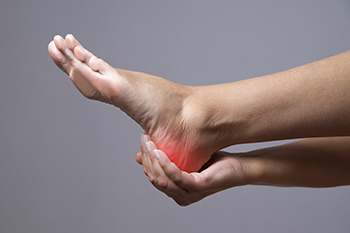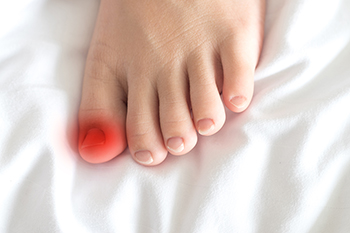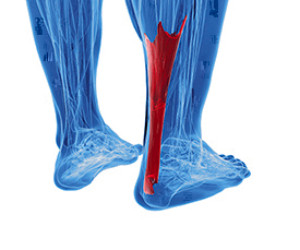Items filtered by date: February 2023
Why Does My Heel Hurt When I Walk?

The heel is generally the first thing that hits the ground when you take a step. Since walking is something that people do throughout the day, heel pain can easily develop. And if you suffer from Achilles tendonitis or plantar fasciitis, just walking from one room to another can become painful. Achilles tendonitis is the inflammation of the tendon that connects the calf muscles to the heel. Tiny tears cause swelling, stiffness, and pain, especially in the back of the heel. Plantar fasciitis occurs when the tissue that runs under the sole of the foot develops tears, causing extreme pain felt mainly in the heel. It is thought to be an overuse injury, largely the result of overtraining. Plus, bone spurs can develop along with plantar fasciitis, increasing the pain felt when walking. A number of other conditions can cause heel pain when you walk. Included are bursitis, stress fractures, and compression of the nerves at the back of the ankle and heel. If heel pain while walking becomes persistent or worsens, it is suggested that you seek the attention of a podiatrist who can determine the cause and offer treatment options.
Many people suffer from bouts of heel pain. For more information, contact the foot specialists of Table Mountain Foot and Ankle. Our doctors can provide the care you need to keep you pain-free and on your feet.
Causes of Heel Pain
Heel pain is often associated with plantar fasciitis. The plantar fascia is a band of tissues that extends along the bottom of the foot. A rip or tear in this ligament can cause inflammation of the tissue.
Achilles tendonitis is another cause of heel pain. Inflammation of the Achilles tendon will cause pain from fractures and muscle tearing. Lack of flexibility is also another symptom.
Heel spurs are another cause of pain. When the tissues of the plantar fascia undergo a great deal of stress, it can lead to ligament separation from the heel bone, causing heel spurs.
Why Might Heel Pain Occur?
- Wearing ill-fitting shoes
- Wearing non-supportive shoes
- Weight change
- Excessive running
Treatments
Heel pain should be treated as soon as possible for immediate results. Keeping your feet in a stress-free environment will help. If you suffer from Achilles tendonitis or plantar fasciitis, applying ice will reduce the swelling. Stretching before an exercise like running will help the muscles. Using all these tips will help make heel pain a condition of the past.
If you have any questions please contact our office located in Wheat Ridge, CO . We offer the newest diagnostic and treatment technologies for all your foot and ankle needs.
We Can Treat Your Foot or Ankle Pain
Causes of an Ingrown Toenail

The painful foot condition that is known as an ingrown toenail can happen from wearing shoes that are too tight. It may also occur from improperly trimming the toenails, or possibly if it tends to run in families. An ingrown toenail generally affects the big toe, and is noticeable as the nail grows into the skin instead of over it. Symptoms can include swelling, redness, and it may become infected. Some patients find temporary relief as they soak their feet in warm water, followed by gently pulling the skin away from the nail. An ingrown toenail will generally produce pain and discomfort, and there is no mistaking what it is from. If you have developed an ingrown toenail, it is suggested that you are under the care of a podiatrist who can properly assess and treat this condition.
Ingrown toenails can become painful if they are not treated properly. For more information about ingrown toenails, contact the foot specialists of Table Mountain Foot and Ankle. Our doctors can provide the care you need to keep you pain-free and on your feet.
Ingrown Toenails
Ingrown toenails occur when a toenail grows sideways into the bed of the nail, causing pain, swelling, and possibly infection.
Causes
- Bacterial infections
- Improper nail cutting such as cutting it too short or not straight across
- Trauma to the toe, such as stubbing, which causes the nail to grow back irregularly
- Ill-fitting shoes that bunch the toes too close together
- Genetic predisposition
Prevention
Because ingrown toenails are not something found outside of shoe-wearing cultures, going barefoot as often as possible will decrease the likeliness of developing ingrown toenails. Wearing proper fitting shoes and using proper cutting techniques will also help decrease your risk of developing ingrown toenails.
Treatment
Ingrown toenails are a very treatable foot condition. In minor cases, soaking the affected area in salt or antibacterial soaps will not only help with the ingrown nail itself, but also help prevent any infections from occurring. In more severe cases, surgery is an option. In either case, speaking to your podiatrist about this condition will help you get a better understanding of specific treatment options that are right for you.
If you have any questions please feel free to contact our office located in Wheat Ridge, CO . We offer the newest diagnostic and treatment technologies for all your foot and ankle needs.
Serious Causes of Foot Pain

Many different things can affect the health of the feet. For example, there can be a problem with the thyroid that interferes with the making of crucial hormones which impacts the nerves associated with sensation in the feet. Degenerative conditions in the lower back leading to irritation of the spinal cord can also affect the health of the feet. Three more serious causes of foot pain are Peripheral Arterial Disease or PAD, rheumatoid arthritis, and gout. PAD occurs when plaque builds up in the arteries of the legs and reduces blood flow to the lower legs and feet. This can lead to a host of problems, including foot pain and wounds that heal poorly. Rheumatoid arthritis develops when the immune system mistakenly attacks joints and can cause swelling and pain in the feet, as well as possibly change the shape of your toes and feet. Gout is another type of arthritis arising from the accumulation of uric acid in the body collecting in joints, particularly the big toe joint. Because foot pain can come on with no obvious cause, if you are having such pain, please see a podiatrist for a proper diagnosis and treatment plan.
Foot Pain
Foot pain can be extremely painful and debilitating. If you have a foot pain, consult with the foot specialists from Table Mountain Foot and Ankle. Our doctors will assess your condition and provide you with quality foot and ankle treatment.
Causes
Foot pain is a very broad condition that could be caused by one or more ailments. The most common include:
- Bunions
- Hammertoes
- Plantar Fasciitis
- Bone Spurs
- Corns
- Tarsal Tunnel Syndrome
- Ingrown Toenails
- Arthritis (such as Gout, Rheumatoid, and Osteoarthritis)
- Flat Feet
- Injury (from stress fractures, broken toe, foot, ankle, Achilles tendon ruptures, and sprains)
- And more
Diagnosis
To figure out the cause of foot pain, podiatrists utilize several different methods. This can range from simple visual inspections and sensation tests to X-rays and MRI scans. Prior medical history, family medical history, and any recent physical traumatic events will all be taken into consideration for a proper diagnosis.
Treatment
Treatment depends upon the cause of the foot pain. Whether it is resting, staying off the foot, or having surgery; podiatrists have a number of treatment options available for foot pain.
If you have any questions, please feel free to contact our office located in Wheat Ridge, CO . We offer the newest diagnostic and treatment technologies for all your foot care needs.
Symptoms and Causes of Achilles Tendonitis

When the back of the heel hurts, it may be caused by a condition known as Achilles tendonitis. This ailment occurs when the strong Achilles tendon becomes inflamed, largely the result of overuse or a sudden increase in activity. Symptoms include pain, stiffness, and discomfort above the area of the heel that is used when stretching or standing on your toes. There are two types of Achilles tendonitis, insertional and noninsertional. The former is the result of tiny tears that occur when the lower portion of the tendon breaks down. The latter is when the tears occur in the middle part of the tendon. Common ways the Achilles tendon becomes compromised include failing to warm up before exercise, wearing high heels, and increasing activity too quickly. Other causes include overpronation, bone spurs, and gout. To find out more about dealing with the pain of Achilles tendonitis, please consult a podiatrist.
Achilles tendon injuries need immediate attention to avoid future complications. If you have any concerns, contact the foot specialists of Table Mountain Foot and Ankle. Our doctors can provide the care you need to keep you pain-free and on your feet.
What Is the Achilles Tendon?
The Achilles tendon is a tendon that connects the lower leg muscles and calf to the heel of the foot. It is the strongest tendon in the human body and is essential for making movement possible. Because this tendon is such an integral part of the body, any injuries to it can create immense difficulties and should immediately be presented to a doctor.
What Are the Symptoms of an Achilles Tendon Injury?
There are various types of injuries that can affect the Achilles tendon. The two most common injuries are Achilles tendinitis and ruptures of the tendon.
Achilles Tendinitis Symptoms
- Inflammation
- Dull to severe pain
- Increased blood flow to the tendon
- Thickening of the tendon
Rupture Symptoms
- Extreme pain and swelling in the foot
- Total immobility
Treatment and Prevention
Achilles tendon injuries are diagnosed by a thorough physical evaluation, which can include an MRI. Treatment involves rest, physical therapy, and in some cases, surgery. However, various preventative measures can be taken to avoid these injuries, such as:
- Thorough stretching of the tendon before and after exercise
- Strengthening exercises like calf raises, squats, leg curls, leg extensions, leg raises, lunges, and leg presses
If you have any questions please feel free to contact our office located in Wheat Ridge, CO . We offer the newest diagnostic tools and technology to treat your foot and ankle needs.

